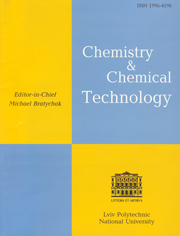Kinetics of Os(VIII) Catalyzed Oxidation of 2-Pyrrolidine Carboxylic Acid in Alkaline Medium using Sodium Periodate as Oxidant: A Mechanistic Approach
| Attachment | Size |
|---|---|
| 214.44 KB |
[1] Nelson D., Cox M.: Lehninger Principles of Biochemistry, 4th edn. W.H. Freeman and Co., New York 2007.
[2] Hiremath C., Kiran T., Nandibewoor S.: J. Mol. Catal. A., 2006, 248, 163. https://doi.org/10.1016/j.molcata.2005.12.018
[3] Seregar V., Hiremath C., Nandibewoor S.: J. Phys. Chem., 2006, 220, 615. https://doi.org/10.1524/zpch.2006.220.5.615
[4] List B., Lerner R., Barbes C.: J. Am. Chem. Soc., 2000, 122, 2395. https://doi.org/10.1021/ja994280y
[5] Das A.: Coord Chem., 2001, 213, 307. https://doi.org/10.1016/S0010-8545(00)00376-3
[6] Srivastava S., Patel R.: World J. Pharm. Pharm. Sci., 2014, 3, 365.
[7] Gupta M., Srivastava S.: Bull. Catal. Soc. India, 2015, 14, 1.
[8] Vijayasri K., Rajaram J., Kuriacose J.: J. Chem. Sci., 1985, 95, 573.
[9] Duk F.: J. Am. Chem. Soc., 1947, 69, 3054. https://doi.org/10.1021/ja01204a038
[10] Buistc G., Bunton A., Hipperson W.: J. Chem. Soc. B, 1971, 2128. https://doi.org/10.1039/J29710002128
[11] Maros L., Molnar-Perel I., Schissel E., Szerdahelyi V.: J. Chem. Soc. Perkin Trans., 1980, 11, 39. https://doi.org/10.1039/P29800000039
[12] Dahlgre G., Reed K.: J. Am. Chem. Soc., 1967, 89, 1380. https://doi.org/10.1021/ja00982a018
[13] Rao M., Sethuram B., RaoN.: J. Indian Chem. Soc., 1980, 57, 149.
[14] Rao D., Sridevi M., Vani P.: Indian J. Appl. Res., 2013, 3, 585.
[15] Mendham J., Denney R., Barnes J., Thomas M.: Vogel’s Text Book of Quantitative Chemical Analysis, 6th edn. Pearson Education, Delhi 2003.
[16] Tuwar S., Nandibewoor S., Raju J.: Trans. Met. Chem., 1991, 16, 430. https://doi.org/10.1007/BF01129458
[17] Feigl F.: Spot Tests in Organic Analysis. Elsevier, New York 1975.
[18] Nelson D., Cox M.: Lehningers, Principles of Biochemistry, 4th edn. Freeman and Co., New York 2007.
[19] Wilson K., Walker J.: Practical Biochemistry, 5th edn. Cambridge University Press, Cambridge 2005.
[20] Devendra M., Gupta Y.: J. Chem. Soc., Dalton Trans., 1977, 1085. https://doi.org/10.1039/DT9770001085
[21] Sethuram B.: Some Aspects of Electron Transfer Reactions Involving Organic Molecules. Allied Publ. Ltd., Mumbai 2003.
[22] Laidler J.: Chemical Kinetics, 3rd edn. Pearson Education Ptc. Ltd., New Delhi 2004.
[23] Upadhyay S., Agrawal M.: Indian J. Chem., 1977, 15A, 709.
[24] Sutin N.: Annu. Rev. Phys. Chem., 1966, 17, 119. https://doi.org/10.1146/annurev.pc.17.100166.001003
[25] Lancaster M., Murray R.: J. Chem. Soc. A, 1971, 2755. https://doi.org/10.1039/J19710002755
[26] Martinez M., Pitarque M., Eldik R.: J. Chem. Soc., Dalton Trans., 1996, 2665. https://doi.org/10.1039/dt9960002665
[27] Shettar R., Hiremath M., Nandibewoor S.: Electron. J. Chem., 2005, 9, 91.
[28] Upadhyay S.: Int. J. Chem. Kinet., 1983, 15, 669. https://doi.org/10.1002/kin.550150708










